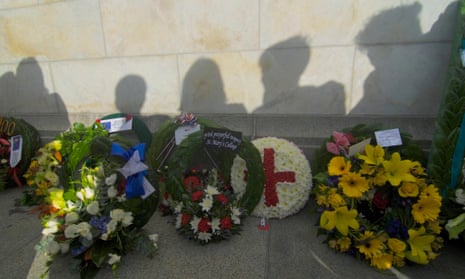It was bizarre watching the Scott McIntyre situation unfold. As an SBS football reporter, the man hardly inhabits the pinnacle of public consciousness. But after a few fairly incoherent criticisms of Australia’s military history on Anzac Day, he had national attention.
Here was a barrel with a dugong jammed in the top: Malcolm Turnbull and all manner of media populists only had to tweet something about a disgrace, include McIntyre’s Twitter handle, then sit back and watch their followers go to work.
Having done my share of research on the world wars, I could happily lecture McIntyre about the holes in his understanding. But those responding to him were not about challenging his views, they were attacking him for stating them. Soon afterwards SBS sacked him, citing breaches of audience trust and social media guidelines. Your feelings about people a century dead may now constitute a sackable offence.
Let’s start with a quick historical assessment of McIntyre’s comments. It’s hard to argue with Gallipoli being “an imperialist invasion of a foreign nation that Australia had no quarrel with”. As for Anzac Day being celebrated by “poorly-read, largely white, nationalist drinkers and gamblers” who lack perspective on the relevant wars, ask the UDL-smashing Instagram kids mangling their hashtags with #letsweforget. So far so good, until McIntyre goes on to prove his own paucity of reading.
Most of the furore surely stemmed from this: “Remembering the summary execution, widespread rape and theft committed by these ‘brave’ Anzacs in Egypt, Palestine and Japan.” And in fact there is plenty of historical evidence of all three crimes.
But for want of a simple qualifier – “some Anzacs” instead of “these Anzacs” – McIntyre descends into hyperbole. Saying they were all criminals is as daft as saying they were all pure as Mont Blanc powder. Labels applied to any group are liable to peel off in a little hot water.
McIntyre really cranked the tap with his next post. “Not forgetting that the largest single-day terrorist attacks in history were committed by this nation & their allies in Hiroshima & Nagasaki”.
It’s hard to know where to start here. Linking Australian soldiers with the US High Command is a mighty stretch – the Manhattan Project was rivalled only by Allied codebreaking for secrecy. You can join the 80-year debate on civilian bombing, but singling out one aerial attack in a war defined by them shows no understanding of context.
Retrospectively applying the rubric of terrorism is specious. At the time the atom bombs were just better explosives in a race for destructive means. The Tokyo firebombing killed more people than either. Only in the post-war nuclear era did atomic bombing assume greater significance. Today, having become such an emotive and obvious symbol, you can gauge the superficiality of someone’s understanding by how soon they invoke it.
Opprobrium didn’t pour down on McIntyre out of respect for historical veracity. It was because he’d disturbed a broadly accepted idea of sanctity on a day that has been secularly consecrated. Without a whole lot to believe in, many of us have deemed Anzac Day holy.
It gives us a sense of belonging and meaning. McIntyre breached the general public accord: not in saying hateful things about people who might suffer as a consequence, but in how we collectively view ourselves and our past.
As much as I think his comments were factually flawed and deliberately designed to inflame, nothing says that I should then send him messages of rage and hate, or that he doesn’t deserve to have a job that is in no way related to those opinions.
It’s interesting that we invest so much into commemorating something we know so little about. In our public understanding, Anzacs are heroes, while we ignore the war crimes that are part of any military history. Anzacs were happy larrikins, not scared kids hiding in mud. Anzacs joined up for freedom, not because of white feathers or poverty or magistrates. The Turks were an honourable enemy at Gallipoli, and in the second world war the Japanese were inhuman – although both killed Allied prisoners or worked them to death building railways. Kokoda saved Australia from invasion, even though Japan’s ships were beneath the Pacific. Anzacs defended our freedom, when few of our wars have served any such purpose.
And statements like those above are disrespectful, as though a fight is less brave when you’re realistic about the context in which it was fought.
The greatest insult you can offer the fallen is to lie about who they were and what they did – to whitewash their sins and burnish their glories. That robs them of the right to be seen as the people they were, and it co-opts their experience for the use of millions of us who were never there and can never know what it was like.
When it comes to disrespect, don’t worry about some guy on Twitter who could stand to spend more time in the library. Worry about the disrespect offered by so many of us who think we’re showing the opposite, the kind of which so much modern commemoration is guilty.
